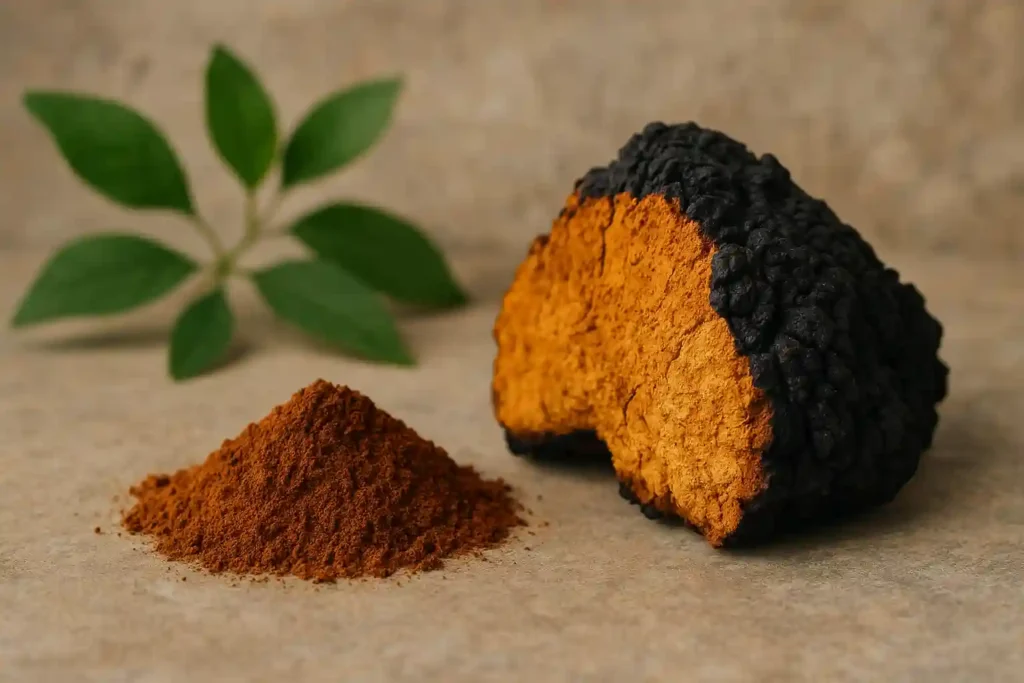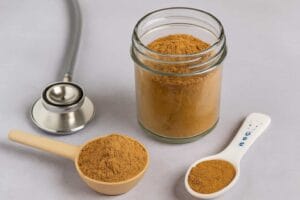When it comes to natural remedies for digestive wellness, Chaga tea for stomach issues has been gaining attention for its potential soothing properties. Derived from the Chaga mushroom, this tea has a long history in traditional medicine, prized for its antioxidant-rich composition and anti-inflammatory effects. Whether you’re exploring alternatives to support your digestive system or simply curious about the benefits of medicinal mushrooms, understanding how Chaga tea can influence stomach health is essential. For those interested in natural wellness, this tea may offer a gentle yet effective approach to promoting digestive comfort and overall gut balance. If you want to explore more about mushroom supplements and heart health, check out our detailed comparison of mushroom gummies vs oyster mushroom for heart health.
The Science Behind Chaga Tea for Stomach Relief
Chaga (Inonotus obliquus) is a fungus that grows primarily on birch trees in cold climates. Traditionally, it has been used in Siberian and Northern European folk medicine for various ailments, including digestive discomfort. The tea made from Chaga is rich in bioactive compounds such as polysaccharides, betulinic acid, and antioxidants like superoxide dismutase, which may contribute to its therapeutic effects.
Research suggests that these compounds can help reduce inflammation in the gastrointestinal tract, promote the healing of stomach lining, and support a balanced gut microbiome. The anti-inflammatory properties are particularly beneficial for individuals suffering from gastritis or acid reflux, as they may help calm irritation and reduce symptoms.

How Chaga Tea Supports Digestive Health
Drinking Chaga tea for stomach concerns may offer several digestive benefits, including:
- Reducing Inflammation: Chronic inflammation in the stomach lining can lead to discomfort and digestive issues. Chaga’s anti-inflammatory compounds help soothe this irritation.
- Antioxidant Protection: The high antioxidant content helps combat oxidative stress, which can damage stomach tissues and impair digestion.
- Immune Modulation: A healthy immune response is crucial for gut health. Chaga’s polysaccharides may enhance immune function, supporting the body’s natural defenses in the digestive tract.
- Promoting Gut Microbiome Balance: Some studies indicate that Chaga can positively influence gut bacteria, which plays a vital role in digestion and nutrient absorption.
These benefits make Chaga tea a promising natural option for those looking to maintain or improve stomach health. For a deeper dive into how mushrooms support the immune system, you might find our article on mushroom gummies vs turkey tail mushroom for immune system boost insightful.
Preparing and Consuming Chaga Tea Safely
Preparing and Consuming Chaga Tea Safely
To enjoy the benefits of Chaga tea for stomach health, it’s important to prepare it correctly. Typically, Chaga tea is made by simmering chunks or powder of the dried mushroom in hot water for an extended period (often 1–2 hours) to extract its beneficial compounds.
- Start with 1–2 tablespoons of dried Chaga chunks or powder.
- Place them in a pot with 7 cups of filtered water.
- Simmer on low heat for 1–2 hours, ensuring the water does not boil vigorously.
- Strain the tea to remove solid pieces.
- Enjoy warm, optionally adding natural sweeteners like honey or cinnamon for flavor.
Because Chaga can interact with certain medications and conditions, it’s advisable to consult a healthcare professional before incorporating it regularly, especially if you have autoimmune diseases or are pregnant.
For best results, always use high-quality dried Chaga sourced from clean environments to avoid contamination with heavy metals or pollutants. Drinking it moderately—about 2 to 3 times a week—is generally sufficient to support digestion and overall wellness without overstimulation. If you prefer a stronger brew, you can steep the same chunks a second time, as Chaga releases its compounds slowly over multiple infusions.corporating it regularly, especially if you have autoimmune diseases or are pregnant.

Potential Side Effects and Considerations
While Chaga tea is generally considered safe for most people, there are a few considerations to keep in mind:
- Blood Sugar Levels: Chaga may lower blood sugar, which could affect people with diabetes or those on blood sugar medications.
- Blood Thinning: It may have anticoagulant effects, potentially interacting with blood-thinning medications.
- Allergic Reactions: Though rare, some individuals might experience allergic reactions to mushrooms.
- Kidney Health: Excessive consumption of Chaga might affect kidney function due to its high oxalate content.
Moderation and professional guidance are key to safely benefiting from Chaga tea for stomach health.
Comparing Chaga Tea with Other Medicinal Mushroom Teas
Chaga is one of many medicinal mushrooms used to support health, each with unique properties. For example, Reishi mushrooms are renowned for stress relief and immune support, while Turkey Tail mushrooms are often used to boost immune function and gut health.
| Mushroom Type | Primary Benefits | Best For |
|---|---|---|
| Chaga | Anti-inflammatory, antioxidant, digestive support | Stomach health, inflammation reduction |
| Reishi | Stress relief, immune modulation | Stress, sleep, immune balance |
| Turkey Tail | Immune boosting, gut microbiome support | Immune health, digestive balance |

Choosing the right mushroom tea depends on your specific health goals, but Chaga tea for stomach issues stands out for its targeted anti-inflammatory and digestive benefits.
F.A.Q
- Is Chaga tea effective for stomach ulcers?
While scientific studies are limited, the anti-inflammatory and antioxidant properties of Chaga tea for stomach ulcers may help reduce irritation and promote healing. However, it should not replace conventional treatments, and consulting a healthcare provider is recommended. - How often should I drink Chaga tea for stomach health?
Moderate consumption is best—typically 1 to 2 cups per day. Overconsumption might lead to side effects like kidney strain or blood sugar changes, so listen to your body and seek medical advice if unsure. - Can Chaga tea interact with medications?
Yes, Chaga tea can interact with blood thinners and diabetes medications due to its blood-thinning and blood sugar-lowering effects. Always discuss with your healthcare provider before adding Chaga tea to your routine. - Does Chaga tea help with acid reflux or indigestion?
Many people use Chaga tea for stomach discomfort, including acid reflux and indigestion, because of its soothing and anti-inflammatory effects. While anecdotal evidence is positive, more research is needed for conclusive claims. - What is the gastroprotective effect of Chaga mushroom
Scientific research on Chaga mushroom (Inonotus obliquus) suggests it may have strong gastroprotective properties. A PubMed study found that its ethanolic extract helped protect the stomach lining and reduce ulceration induced by ethanol in experimental rats. These findings highlight Chaga’s potential for supporting digestive health and preventing gastric damage. You can read the full scientific paper on PubMed Assessment of the Gastroprotective Effect of the Chaga Medicinal Mushroom.



